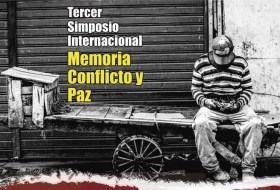News
Unicauca led III International Symposium: Memory, Conflict and Peace 2020
Through presentations and experiences of important national and foreign academics, society was called to commit to Territorial Peace.
In order to offer a space for inclusive analysis on the need to achieve peace in the region, the country and the world, between November 19 and 20, 2020, the International Symposium took place: “Memory, Conflict and Peace”, an event organized by the University of Cauca, through the Integral, Social and Humanistic Training Component FISH.
This inclusive space for reflection, moderated by the Academic Vice-Rector of the University of Cauca, Luis Guillermo Jaramillo and the dean of the Faculty of Human and Social Sciences, Tulio Enrique Rojas, had the participation of prominent speakers from the regional, national and academic fields as Erick Valdés, professor at Princeton University (United States), who spoke about Transitional Justice in Colombia; Constanza Eugenia Ovalle, representing El Bosque University (Colombia), focused her presentation on the Challenges for Education in Bioethics; For his part, Alfredo Rocha de la Torre, professor at the Pedagogical and Technological University of Colombia, referred to the Preeminence of the Other and the Spiritual Capitalism of the West.
Likewise, the exhibitors critically delved into aspects of collective interest related to Memory, seen as the mechanism used by communities to not forget what happened and about Peace, which seeks to minimize conflicts and points in a resilient way to the reconciliation between the different social actors in conflict in different sectors of Cauca and Colombia.
Other academics such as Stella Schindel, from the Viadrina University of Frankfort (Germany), who referred to the ethics and aesthetics of memory, also presented their presentations and experiences about the need to help build a peaceful culture for conflict resolution. ; Ana Cristina Navarro, from the Truth Commission, developed the topic related to pedagogy to break silence in the classroom; Likewise, Fredy Patiño Montero, on behalf of the Universidad Santo Tomás, spoke about the teaching of the humanities and her commitment to building peace.
At this symposium, a call was made for society to commit itself to Territorial Peace, the commitment and project of the rectorial administration of the University of Cauca, which works from the region to transcend at the national level, since Alma Mater leads the process of rebuilding the social fabric, affected by more than half a century of armed conflict in Colombia, with Cauca being one of the departments that has suffered the most from this scourge.
In this scenario of exchange of ideas, the Colombian and foreign lecturers also developed other topics related to violence without war, a conceptual and practical challenge, the forms of memory, experiences and solidarity in the face of violence, with these and other themes in this Symposium that was held for two days from the different social networks of the University of Cauca.
"At the University of Cauca we proposed to carry out a program that would call for constant reflection on the problems that Colombian society is going through, taking into account that the fundamental motto of this university direction is 'Towards a University Committed to Territorial Peace' , so we set ourselves the task of designing programs aimed at the university community and the public as a whole, around conflict, memory and peace ”, stated Gilma Ríos, coordinator of the Integral, Social and Humanistic Training Component FISH from the University of Cauca.
Since 2018, this educational institution offers an internal seminar to teachers who are part of the FISH component, in order to make an analysis on issues related to peace as a training experience and to strengthen the social sectors of Cauca in a coordinated and coherent.
The role of the academy as an agent of change and peace manager was highlighted, it allows it to exercise full and responsible citizen leadership to manage, from its responsibility, the transition from a culture of violence to one of peace with an integral vision, according to the country's new reality, promoting sustainable development to improve the population's living conditions.
More Info:
Comprehensive, Social and Humanistic Training Component FISH


